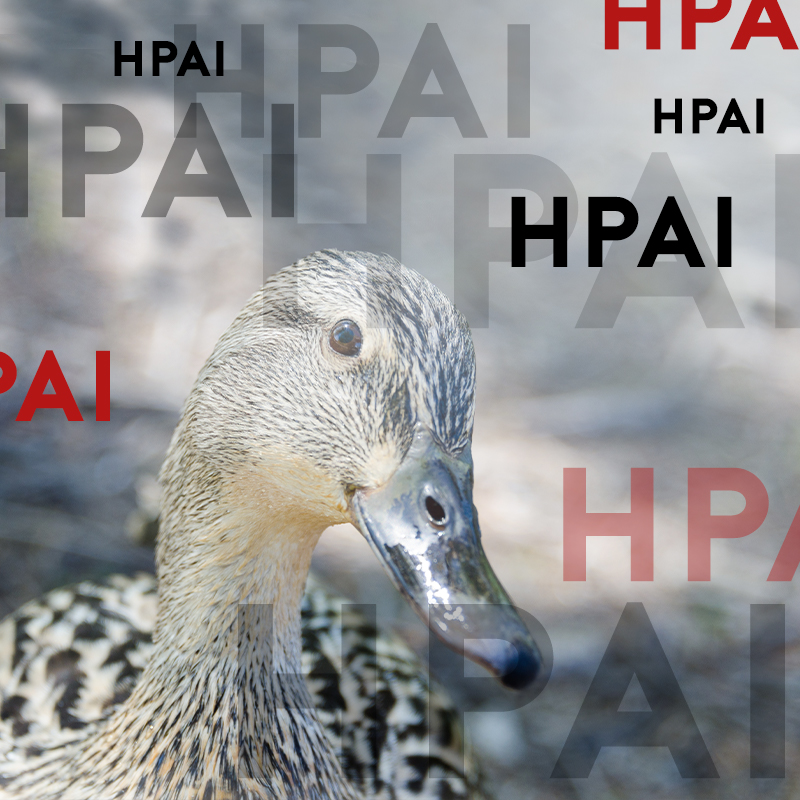
Not a happy topic, but let’s talk about Avian Influenza (AI). In February 2022, it was found that a of strain of Highly Pathogenic Avian Influenza (HPAI) had entered the United States and was detected first in Indiana. Since then, HPAI has been found in over 40+ states with over 46 million birds affected.
In general terms, AI is also known at bird flu. It is an infectious disease found in birds and it is caused by Type A Strains of the influenza virus. There are two variations of AI – Low Path (LPAI) which is non-lethal and has no signs of infection with minor symptoms. The second type is High Path (HPAI) which is the real deal. HPAI is very serious because it is highly transmissible, and it has a high mortality rate in poultry. HPAI is what we are currently dealing with in the United States.
HPAI rapidly kills chickens and turkeys. Ducks usually do not become sick but they are carriers and when ducks are infected, they can pass the disease on to other birds. If HPAI is diagnosed in a poultry flock, all poultry flocks within at least a 7 mile range are tested. If HPAI is found there, whether they are sick or not, all birds are destroyed. If they are not positive, but within 7 miles, it is very difficult to move eggs off the property.

It is important that we are all vigilant with our biosecurity because biosecurity is our number one defense against AI. There is no medication for AI. Protection from interaction with wild birds is key. Here are some guidelines that should be kept in mind and practiced at home on a regular basis to deter the spred of AI:
Biosecurity Guidelines
- Keep your flock protected from interaction with wild birds and their droppings. Indoor is best.
- Know your buildings. Make sure there are no places where wild birds can enter. Bird proof.
- Keep your doors open as short a period as possible when feeding or adding bedding.
- Do not go near ponds where wild ducks may visit.
- Make sure no one visits your farm that has been near ponds or wild ducks or geese.
- Make sure wild bird droppings are not entering the barn on boots or on the bedding. Use sanitizing footbaths.
- Frequently clean both sides of your entry room floor.
- Have designated “coop shoes”. Clean both your outside and inside boots on a daily basis.
- Wash your hands and sanitize your equipment between flocks.
- Do not attract wild birds. Remove bird feeders and baths.
- Only purchase from reputable NPIP hatcheries.
Metzer Farms and AI
Metzer Farms is a member of the National Poultry Improvement Plan (NPIP) and we are NPIP Certified. The NPIP is a voluntary State-Federal cooperative testing and certification program for poultry breeding flocks, ducklings, goslings, hatching eggs, hatcheries, and dealers with respect to freedom of certain diseases.
We have strict biosecurity practices in place to help ward off and prevent the spread of diseases such as HPAI at our CA & TN hatchery locations. In addition to the above Biosecurity Guidelines, we have the following measures in place at our hatcheries:
Here is a link to the USDA's current 2022 HPAI Detections in the US
Symptoms of HPAI in Your Flock
Birds infected with the HPAI virus may show one or more of the following signs:
Click here to read about what the USDA has to say about signs of illness
What If Your Waterfowl Have Been Exposed To AI?
If you notice sick birds or abnormal mortality, do not hesitate to contact your personal veterinarian, your state veterinarian, your local cooperative extension office, or your state animal diagnostic laboratory. The USDA can also direct you to a local organization in your area who can help: 1-866-536-7593.